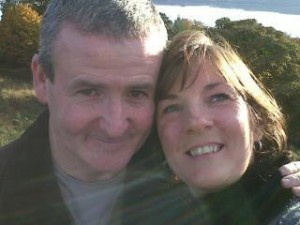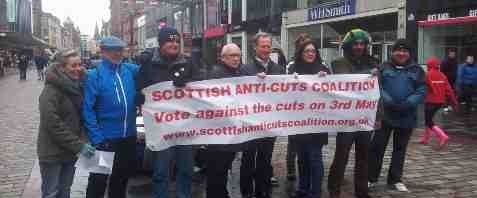By Harvey Duke

Harvey and Isobel
For most people on this beautiful, and sometimes terrible planet, life is a struggle. In some areas it is a struggle against the elements – trying to stay warm against incredible cold, or trying to stay sheltered from awesome storms where the very universe seems to be twisted and ripped to pieces.
Life itself then presents human beings with great challenges – including the war against disease.
History is full of examples of courage shown by people from many cultures facing challenges to their survival – as individuals, families, and sometimes whole communities. Our capacity to cooperate, and our endless ability to use our knowledge and imagination has helped us to overcome millions of challenges. Humanity has had great victories, as well as tragedies.
It is perhaps useful to consider these natural challenges at a time in our history when we are forced to confront challenges which are artificially created. It is one thing for a society to face a tsunami, for example – a storm which has a greater physical power than any human-made technology. It is another thing to face a government hell-bent on forcing millions of people into homelessness and abject poverty. (Incidentally, even an apparantly unstoppable force like a tsunami can be opposed and partly tamed through human ingenuity and cooperation – making stronger buildings, for example.) No one is to blame for a tsunami itself, but in any unnatural attack upon the lives of millions of people, someone is always to blame. And something can always be done to stop the unnatural storm in its tracks!
In 1986 I remember heading off in one of 2 coachloads of protesters going to Liverpool from Dundee. We were going to show our solidarity with the struggle of Liverpool City Council against Thatchers government. For as long as I live I will remember the contrasts of driving through different parts of that city. First, as we arrived in the city, the bus went quiet as we passed street after street of run- down buildings, old posters on walls flapping in the wind, expanses of wasteland. Then, we passed by streets of gleaming new council housing – a sight seen nowhere else in the country. Our spirits soared as everyone on those buses began to realise – through our own eyes – what this struggle by a socialist-led council was all about. Whilst Labour councillors in most other areas of Britain excelled only in excuses, or only in passing on cutbacks, here was a city that dared to fight, and in fighting it made life better for ordinary people. And marching through those streets with tens of thousands of fellow protesters, I sensed – not for the last time – the power of the working class when we have leaders who are not afraid to fight the rich to win the gains that all workers deserve.
One leader of that struggle – Tony Mulhearn – is now standing in Liverpools mayoral contest, under the banner Trade Union and Socialist Coalition. Once again, a socialist is pointing out that cuts from a vicious, ruling class clique are not a force of nature but are unnatural and unnecessary. In The Socialist, Tony is quoted saying: “There is no need for these cuts. There is a £120 billion tax gap of evaded, avoided and uncollected tax. The UK holds £850 billion in banking assets. There is some £731 billion lying in the banks uninvested by big business.”
Often, politicians use big figures to bamboozle and mislead voters. But here, Tony Mulhearn is simply pointing out the colossal waste of resources which exist in our society. And when he goes on to promise that, if elected, he would set about reversing cuts in services for young people and others in Liverpool, he does this with a track record of implementing socialist policies. The houses which that socialist-led council built in the 1980s are there to this day.
Another fighter standing in an election soon – in May – is my good friend and fellow anti-cuts campaigner John McArdle. He is standing for the Leith Walk Ward, in Edinburgh. This is an area of particular resonance for John, as it is where musician and poet Paul Reekie lived, until his tragic suicide in June 2010. The circumstances surrounding his death were noted by those who knew him well: suffering from depression, his condition was made much worse by the brutal decision to end his housing benefit and incapacity benefit. Letters announcing these decisions were found near his body. This tragedy, and knowledge about thousands of other people unnecessarily forced into despair, led John McArdle and others to set up a campaign group – Black Triangle. It has since become famous in the anti-cuts movement for its implacable opposition to benefit cuts and the appaling demonisation of people with disabilities by the Tory-Liberal government.
I first came across John and Black Triangle during my own debate challenge to Iain Duncan Smith. Whilst I was popping up on tv and radio to get up the snooty nose of that particularly cowardly Tory politician, John and his group were giving me encouraging messages of support, often on Facebook. At first, I mistakenly thought of Black Triangle as a group which existed mainly online. Although this is an important part of its anti-cuts campaigning, giving fighters with disabilities a means of keeping in touch with campaigns, it is much more than this. At the founding conference of the Scottish Anti Cuts Coalition in Glasgow, I remember meeting John for the first time in person. He strode over to the microphone, and I noticed a few veteran trade unionists and others take immediate notice – those who have fought in many wars are able to sense another real battler before a word is spoken. And he didn’t let us down – launching into a blistering attack on the notion that we should accept any cuts.
Since then, our paths have sometimes crossed on demos, and at meetings, and I have followed with great respect the ongoing campaign by Black Triangle to force private healthcare gang Atos and their abominable, anti-disabled ‘tests’ out of the benefits system forever. Recently, this campaign had an important victory – winning the backing of Scotland’s doctors to call for the ending of these inhuman procedures which are purely designed to throw sick and disabled people off of benefits. This struggle is far from over, but thanks to the tireless efforts of John McArdle and his merry band of Black Triangle outlaws, a strong voice of opposition is heard throughout the country. In time, I have no doubt, it will find its fulfillment in the ending of an unfair system which persecutes the poor, and the resurrection and rejuvenation of a welfare system which cares about human beings and treats us all with respect.
There are great opportunities ahead of us, as well as obstacles to overcome. The Tory attacks are not a force of nature, the cuts are not inevitable. But even if they were, we have – on our side – fighters of the calibre of John McArdle, or Lynn and Gail Sheridan, or youth worker John Park, or, in my hometown of Dundee Wayne Scott who has led important youth demos against the government. And, from time to time, as George Galloway’s campaign in Bradford highlighted, the combination of a good fighter and an angry working class can come together like a tsunami of protest! Let the winds of change blow down the walls of despair! Victory to socialist and anti-cuts candidates!


No responses yet